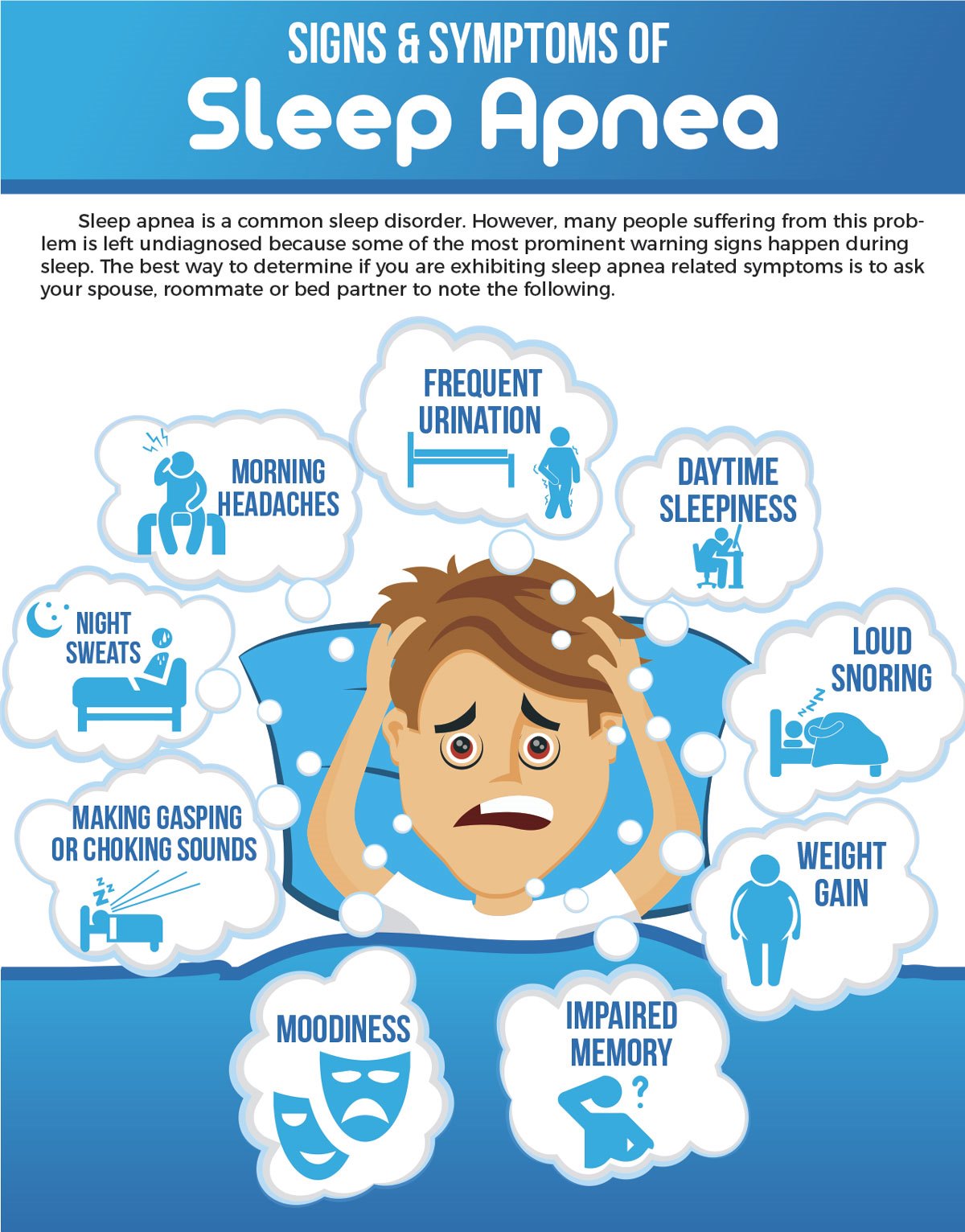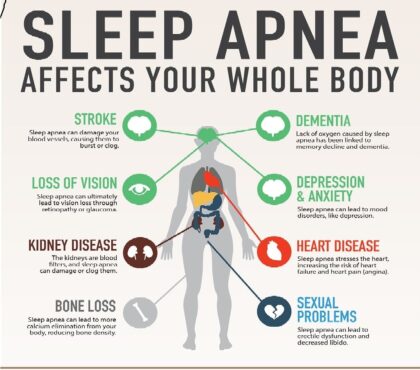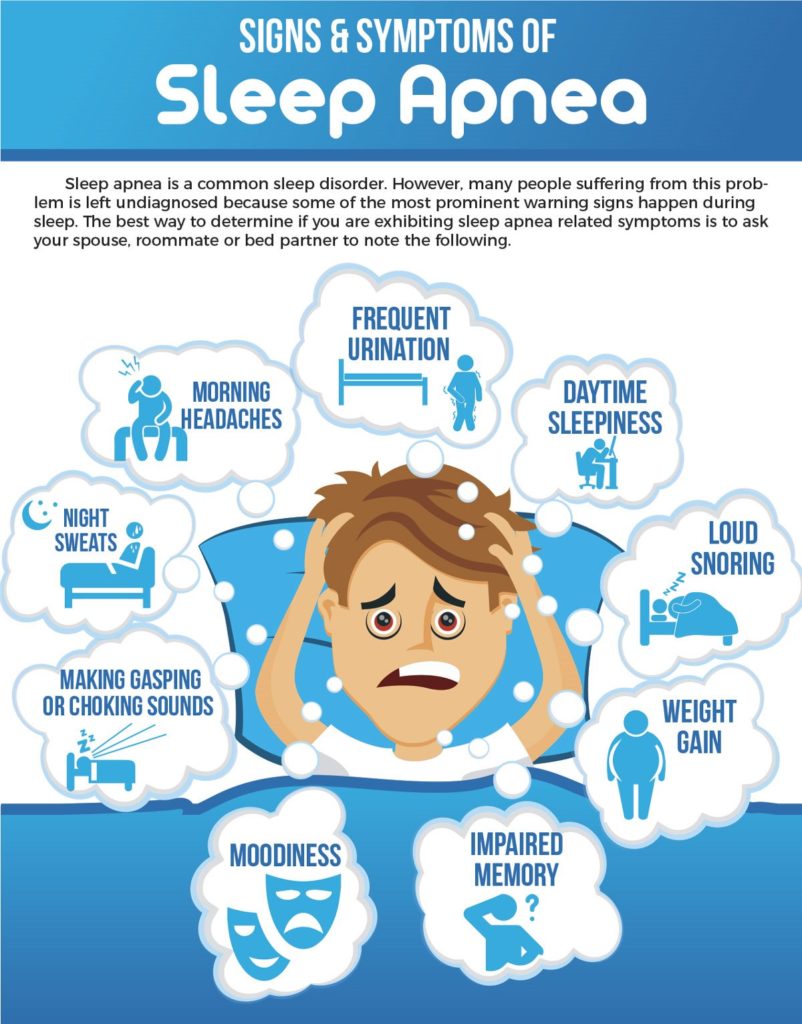Sleep apnea might just be the hidden culprit behind your restless nights and groggy mornings. Imagine waking up refreshed, ready to tackle the day with energy and focus.
Sounds like a dream, right? Understanding the signs of sleep apnea can be your first step toward transforming that dream into a reality. Are you often tired, even after what you thought was a good night’s sleep? Do you find yourself dozing off during the day or struggling to concentrate?
These are just some of the red flags your body might be waving at you. Recognizing these signs is crucial—not just for your sleep quality, but for your overall health and well-being. You’ll discover the key signs of sleep apnea and how they can impact your life. By identifying these symptoms early, you can take control and seek the help you need. Don’t let another night slip away; your path to better sleep and a healthier life starts here. Keep reading to uncover the signs you need to watch for.
Recognizing Sleep Apnea Symptoms
Loud snoring and daytime fatigue often point to sleep apnea. Gasping for air during sleep is another sign. Morning headaches and difficulty concentrating also suggest this common sleep disorder. Recognizing these symptoms early can lead to better sleep quality and overall health.
Sleep apnea is more than just a nuisance that disrupts your sleep. It’s a serious condition that can have a significant impact on your health and quality of life. Being able to recognize the symptoms of sleep apnea can be the first step toward seeking help and improving your well-being. Here’s what to watch for:
Loud Snoring And Choking Sounds
Does your partner complain about your thunderous snoring? Or perhaps you’ve woken up with a jolt, gasping for air? These are common signs of sleep apnea. Loud snoring, especially when accompanied by choking or snorting sounds, indicates that your airway is being obstructed during sleep. If you’re noticing these signs, it might be time to have a conversation with your doctor.
Daytime Fatigue And Sleepiness
Ever find yourself dozing off during a meeting or while watching TV? Daytime fatigue is more than just an inconvenience. It can be a signal that your sleep quality is poor. Sleep apnea often leads to interrupted sleep, leaving you feeling tired and sluggish the next day. This can affect your work, relationships, and overall mood. Are you ready to take control of your energy levels?
Morning Headaches And Dry Mouth
Waking up with a headache or dry mouth can be frustrating. These symptoms may be linked to sleep apnea. The lack of oxygen during the night can lead to morning headaches, while sleeping with an open mouth can cause dryness. If these symptoms persist, they shouldn’t be ignored. Have you considered how these small nuisances might be impacting your daily life?
Difficulty Concentrating
Struggling to focus on tasks or remember simple things? This could be a result of poor sleep due to sleep apnea. When your brain doesn’t get enough rest, your concentration and memory can suffer. This can lead to decreased productivity and increased stress. How often do you find yourself zoning out when you need to be at your best? Recognizing these symptoms is crucial for getting the help you need. Sleep apnea can be managed with the right treatment and lifestyle changes. If any of these signs resonate with you, reach out to a healthcare professional. Your health and happiness are worth it.
Types Of Sleep Apnea
Sleep apnea can be a silent disruptor of your night’s rest, impacting your energy levels and overall health. Understanding the types of sleep apnea can help you identify symptoms and seek appropriate treatment. Let’s explore the different types and how they might affect you.
Obstructive Sleep Apnea
Obstructive Sleep Apnea (OSA) is the most common type. It occurs when the muscles in your throat relax excessively during sleep, blocking your airway. Imagine trying to breathe through a straw that’s being pinched closed.
People with OSA often snore loudly and may wake up gasping for air. If you’ve ever wondered why your partner sounds like a chainsaw at night, this might be the reason. It’s not just annoying; it’s a sign that their sleep—and possibly yours—is being interrupted.
Consider the impact on your daily life. Are you feeling more tired than usual? If so, addressing OSA could be the first step toward regaining your energy.
Central Sleep Apnea
Central Sleep Apnea (CSA) is less common and stems from a different issue. With CSA, your brain doesn’t send the right signals to your breathing muscles. It’s as if your brain forgets to tell your body to breathe.
This type of apnea often occurs in people with certain medical conditions, like heart failure or stroke. You might not snore, but you may experience pauses in breathing.
If you suspect CSA, it’s crucial to seek medical advice. A professional can evaluate your symptoms and recommend a treatment plan tailored to your needs.
Complex Sleep Apnea Syndrome
Complex Sleep Apnea Syndrome, also known as treatment-emergent central sleep apnea, combines elements of both OSA and CSA. It’s what happens when you treat OSA but develop CSA symptoms.
This can be particularly challenging because symptoms overlap. You may start with loud snoring and gasping, then notice pauses in your breathing even after treatment.
Have you ever felt like your treatment isn’t working? This might be why. Consult your doctor to adjust your approach and improve your sleep quality.
Understanding these types of sleep apnea can empower you to take charge of your sleep health. Are you ready to improve your nights and energize your days?
Risk Factors
Sleep apnea often sneaks into lives unnoticed. Knowing its risk factors is vital. Risk factors increase the chances of developing this sleep disorder. Understanding these can guide preventive measures. Let’s explore some key risk factors.
Age And Gender
Age plays a significant role in sleep apnea risk. It becomes more common after age 40. Men face higher risks compared to women. Hormonal differences might be a reason. Post-menopausal women see an increased risk too.
Weight And Obesity
Excess weight is a major risk factor. Fat deposits around the neck can block airways. Obesity increases the likelihood of sleep apnea. Losing weight often helps reduce symptoms.
Family History
Genetics can influence sleep apnea. A family history increases the risk. Shared genetic traits might contribute. Knowing family history helps in early detection.
Lifestyle Choices
Smoking affects sleep apnea risk. It causes inflammation and fluid retention. Alcohol relaxes throat muscles, worsening symptoms. Unhealthy habits can increase sleep apnea risk.

Credit: gpsdentalsa.com
Diagnosis Techniques
Understanding sleep apnea starts with proper diagnosis. Different methods can identify this sleep disorder. Accurate diagnosis ensures effective treatment plans. Below are common techniques professionals use.
Polysomnography
Polysomnography is a detailed sleep study. It takes place in a sleep lab overnight. Patients are monitored for various sleep patterns. This test checks breathing, heart rate, and brain activity. It provides a comprehensive view of sleep health. Doctors use this to confirm sleep apnea and its severity.
Home Sleep Apnea Testing
Home Sleep Apnea Testing offers convenience. Patients wear sensors while sleeping at home. The test records breathing patterns and movements. It’s suitable for those with suspected moderate apnea. Results help doctors decide further treatment steps. It’s less invasive than lab studies.
Consulting A Sleep Specialist
Consulting a sleep specialist can be crucial. Specialists evaluate symptoms and medical history. They may suggest tests or lifestyle changes. Their expertise guides patients towards better sleep health. Conversations with specialists are informative. They clarify doubts and offer solutions.
Treatment Options
Various treatments can address sleep apnea signs like snoring and daytime fatigue. Options include lifestyle changes, CPAP machines, and oral appliances. Consulting a healthcare provider helps determine the best approach for your needs.
Dealing with sleep apnea can feel overwhelming, but understanding the treatment options can make a world of difference. Each person’s journey is unique, and discovering the right approach can significantly improve your quality of life. Let’s dive into some of the most effective strategies available today.
Continuous Positive Airway Pressure (cpap)
The CPAP machine is often the first line of defense against sleep apnea. It provides a steady stream of air, keeping your airway open throughout the night. Many people find it life-changing, as it dramatically improves sleep quality. However, getting used to the mask can take time. Imagine trying to sleep with a snorkel on! It’s a commitment, but the benefits often outweigh the initial discomfort.
Lifestyle Changes And Weight Management
Simple lifestyle changes can have a big impact on sleep apnea symptoms. Losing weight, for instance, can reduce fatty deposits in your throat, easing airflow. Regular exercise and a balanced diet are your allies in this fight. Think about the small choices you make daily. Could switching from sugary drinks to water, or taking the stairs instead of the elevator, become part of your routine? Small steps add up.
Surgical Interventions
For some, surgery might be the best option. Procedures vary, from removing excess tissue to repositioning the jaw. It’s a decision not taken lightly, but for those with severe cases, it can be a game-changer. Remember, surgery is not a quick fix. Recovery takes time, and results can vary. Have you considered discussing this with a trusted healthcare provider to weigh the pros and cons?
Oral Appliances
Oral appliances are like a sports mouthguard and are worn while sleeping. They work by moving your lower jaw forward to keep the airway open. These devices are less intrusive than a CPAP and can be a great alternative for mild cases. Imagine having a solution that fits in your pocket. It’s convenient, but make sure it’s custom-fitted by a dental professional to ensure effectiveness and comfort. By exploring these options, you can find a treatment plan that suits your needs and lifestyle. Which path seems most aligned with your comfort and health goals?
Impact On Daily Life
Sleep apnea disrupts more than just a good night’s rest. Its impacts extend into various aspects of daily life. This condition can leave you feeling drained and irritable. It affects mental health, relationships, and work performance. Understanding these impacts helps in managing sleep apnea better.
Effects On Mental Health
Sleep apnea can lead to mood swings and anxiety. Lack of quality sleep affects emotional balance. Many feel more stressed and less patient. This can make everyday tasks feel overwhelming. Concentration and memory may also suffer. These mental health challenges can be frustrating.
Relationship Challenges
Sleep apnea can strain relationships. Your partner might be disturbed by loud snoring. Sleepless nights can lead to irritability and misunderstandings. Communication may suffer due to fatigue. This condition can create distance between partners. Addressing sleep apnea can improve household harmony.
Work Performance Implications
Sleep apnea impacts job performance. Tiredness can decrease productivity. Mistakes might increase due to poor focus. Frequent sleepiness can lead to absenteeism. This affects career growth and job satisfaction. Managing sleep apnea can enhance work efficiency.
Prevention Strategies
Sleep apnea can disrupt life. Prevention strategies are vital. They promote restful nights and healthier days. Understanding these strategies can help reduce risks and improve sleep quality.
Maintaining Healthy Weight
Excess weight can narrow airways. This raises sleep apnea risk. Shedding extra pounds can reduce symptoms. Healthy weight supports better breathing during sleep.
Regular Exercise
Exercise strengthens the heart and lungs. It aids weight management too. Regular activity improves sleep patterns. Aim for 30 minutes most days. Choose activities you enjoy.
Avoiding Alcohol And Smoking
Alcohol relaxes throat muscles. Smoking inflames airways. Both increase sleep apnea risk. Cutting them out can ease symptoms. Consider healthier lifestyle choices.
Establishing A Sleep Routine
Consistent sleep schedules improve rest. Try to sleep and wake at the same time daily. A routine encourages regular sleep cycles. Limit screen time before bed. Create a calming bedtime ritual. This prepares your body for sleep.

Credit: www.schneckmed.org

Credit: gpsdentalsa.com
Frequently Asked Questions
What Are Common Signs Of Sleep Apnea?
Common signs of sleep apnea include loud snoring, gasping for air during sleep, and excessive daytime sleepiness. Individuals may also experience morning headaches, difficulty concentrating, and irritability. Sleep apnea can lead to disrupted sleep patterns, making it crucial to seek medical advice if these symptoms persist.
How Does Sleep Apnea Affect Daily Life?
Sleep apnea can severely impact daily life by causing chronic fatigue and reduced concentration. This condition can lead to increased irritability and mood swings. Additionally, untreated sleep apnea may result in poor work performance and a higher risk of accidents due to impaired alertness.
Can Sleep Apnea Lead To Other Health Issues?
Yes, untreated sleep apnea can lead to serious health issues. It increases the risk of high blood pressure, heart disease, and stroke. Sleep apnea can also worsen diabetes and lead to metabolic problems. It’s important to diagnose and treat sleep apnea to reduce these health risks.
What Causes Snoring In Sleep Apnea?
Snoring in sleep apnea occurs when the airway is partially blocked during sleep. This blockage causes vibrations that result in snoring sounds. Factors contributing to snoring include obesity, nasal congestion, and sleeping on your back. Addressing these factors can help reduce snoring and improve sleep quality.
Conclusion
Sleep apnea is a serious health issue. Recognizing its signs is crucial. Loud snoring and choking during sleep are common indicators. Feeling tired after a full night’s sleep? You might have sleep apnea. Morning headaches and difficulty concentrating are also warning signs.
Seeking medical advice early can prevent complications. Treatment options are available and effective. Don’t ignore symptoms. Prioritize your health and consult a doctor. A proper diagnosis leads to better sleep. Better sleep means a healthier life. Stay informed, stay healthy.
Address sleep apnea concerns promptly. Your well-being is worth the effort.
